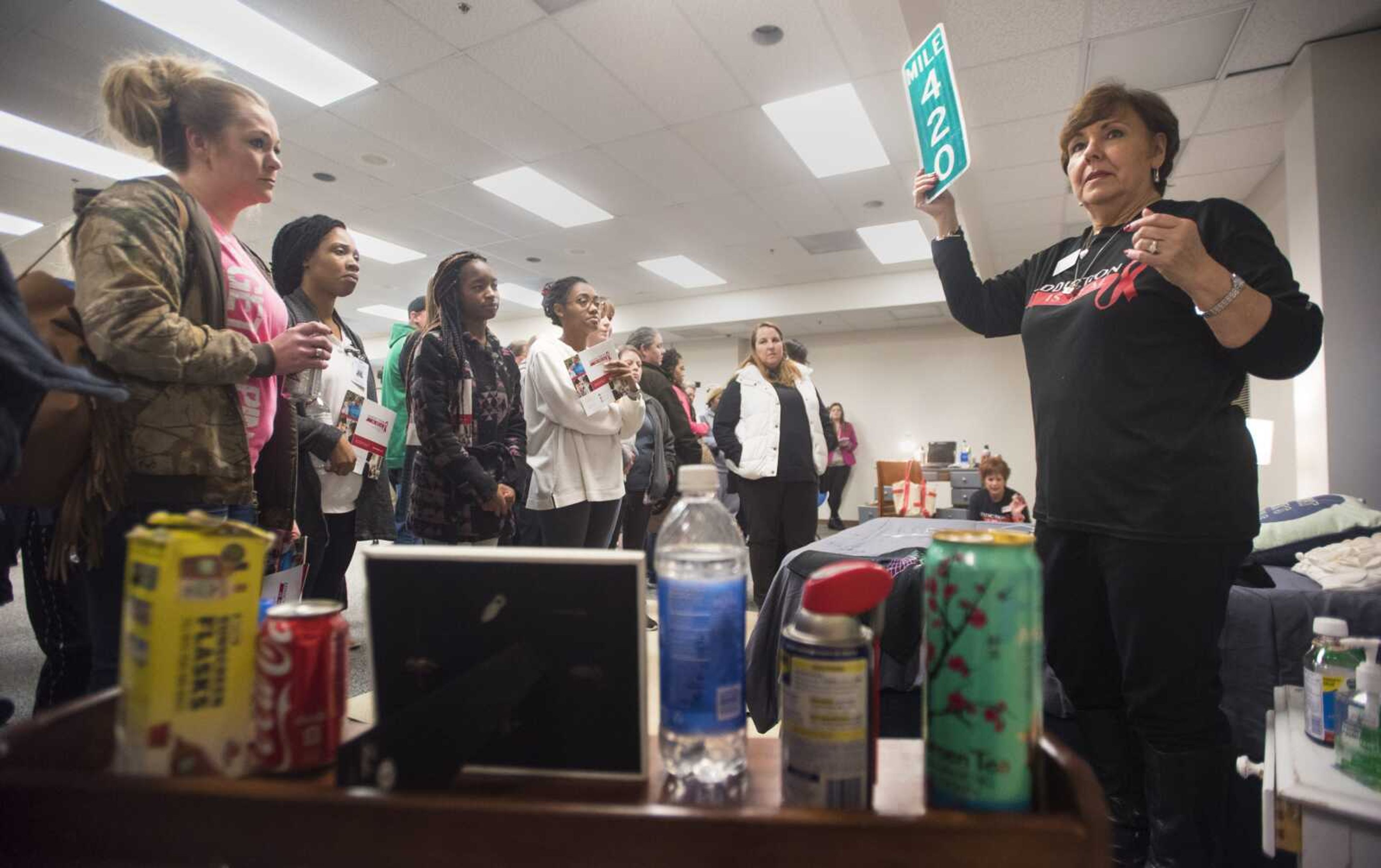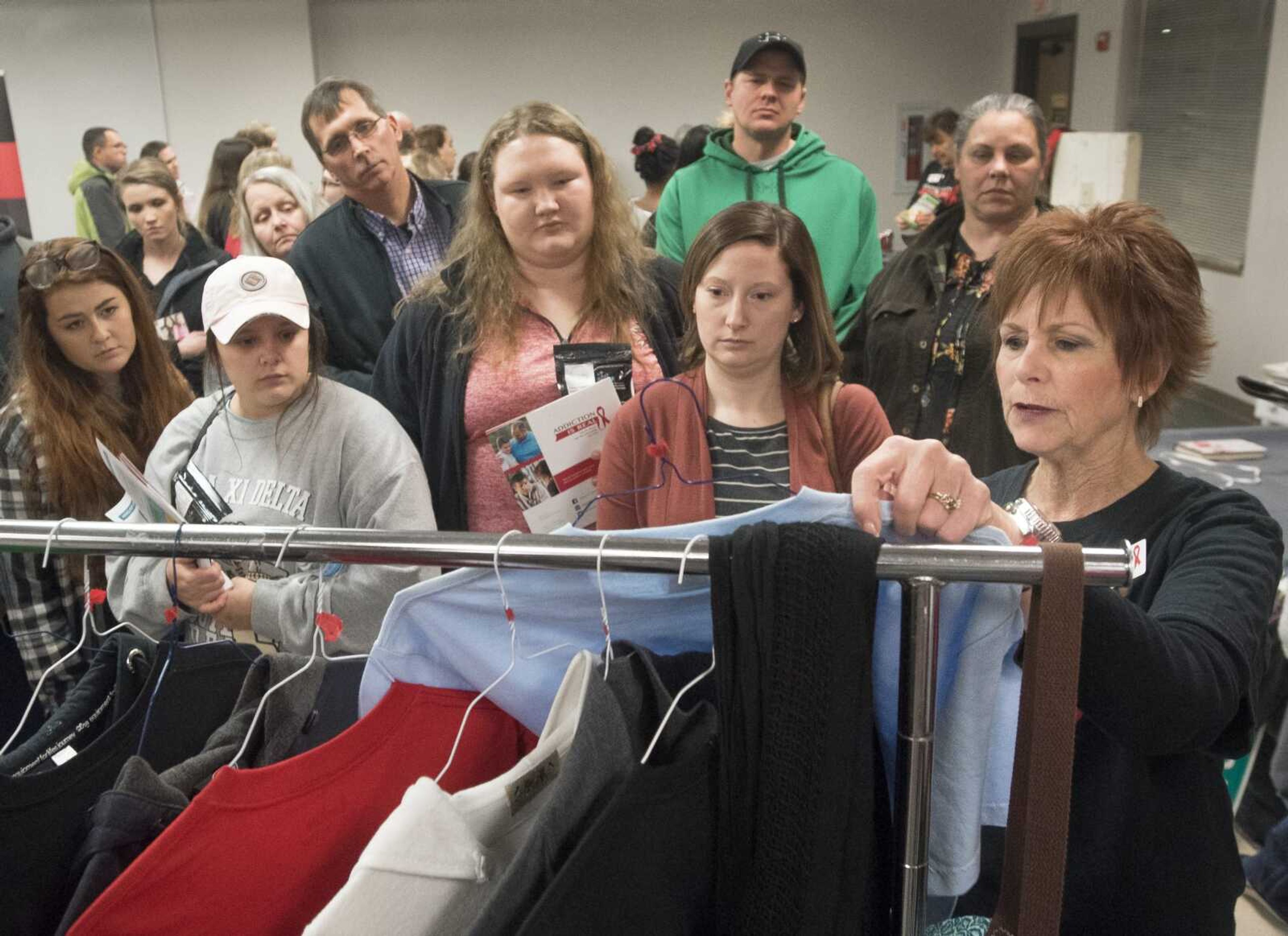'Keep looking:' SUPER Coalition event teaches parents about warning signs for teen drug use
Baseball caps, Pringles cans, bicycle pumps, trash cans and staplers: These are items a parent might find in their teenager’s bedroom. They’re also items in which a young person might use to hide or abuse drugs, according to presenters at the Substance Use Prevention Education and Resources (SUPER) Coalition’s Hidden in Plain View event Thursday night in Cape Girardeau...
Baseball caps, Pringles cans, bicycle pumps, trash cans and staplers: These are items a parent might find in their teenager’s bedroom.
They’re also items in which a young person might use to hide or abuse drugs, according to presenters at the Substance Use Prevention Education and Resources (SUPER) Coalition’s Hidden in Plain View event Thursday night in Cape Girardeau.
More than 100 people turned out to the adult-only event to learn about risky teenage behavior that may be signs or symptoms of drug use. Presenters from St. Louis-based not-for-profit organization Addiction is Real walked attendees through an exhibit of a teenager’s bedroom featuring more than 70 items that could signal risky behavior for parents or guardians who know what to look for.
“If you find one thing in your kid’s room tonight that we have here, that doesn’t mean your kid is doing drugs,” Addiction is Real vice president Teri Douglas said to those gathered around the exhibit. “But keep looking.”
The SUPER Coalition was founded through the Cape Girardeau County Public Health Center last year as a concerted effort to decrease substance use and misuse in Cape Girardeau County, according to health educator Maria Davis.

“It can be uncomfortable [for parents] to have that conversation,” Davis said. “ ... [We hope] that [parents] can kind of hold these items in their hands, have a hands-on experience with the things that teens may be coming into contact with every day.”
The need for the SUPER Coalition, which became registered with the state nearly a year ago, was born after the county health department hosted an opioid summit in 2017 to address the growing trend of opioid misuse in the community, Davis explained.
“From that, a bunch of organizations within Cape County really said, ‘Hey, this is a problem here and we need to do something about it,’” Davis said.
At Thursday’s event, Addiction is Real president Pam Greenberg explained to attendees the dangers drug abuse can present young people.
“Kids nowadays are much more educated because of the internet,” she said. “ ... They are asking questions, and they are asking their parents, ‘Did you ever use drugs?’”
Parents and guardians of teenagers who pose such questions have a choice to make, Greenberg said, between telling them the truth, whether they used drugs at any point, or not.
“But if you do share that you did [use drugs], I beg you to remind them that drugs when you were a kid are different than drugs now,” she said. “These are killer drugs out on the street. If they’re laced with fentanyl, they could die the first time they try them; they can get addicted the first time they try them. This is serious stuff.”
So why do young people use drugs?
Peer pressure, a lack of confidence, misinformation popular media, boredom and rebellion were reasons Greenberg mentioned, as well as the instant gratification or self-medication drugs can provide to users.
But children are especially vulnerable, she said, because the brain does not develop the ability to weigh long-term consequences or control impulses until it is fully developed, after the age of 20.
“It can stunt their mental growth,” she said. “ ... We’ve got to try to keep them clean and sober until at least their brain’s a little more mature, at least the legal age of 21.”
One way parents can help prevent a substance-use disorder in their children is by being proactive instead of reactive, Greenberg said.
“Have the talk now,” she said. “You don’t want to find out there’s a problem and then sit them down. I mean, God forbid they’re already addicted.”
Some warning signs a teenager or young person might be caught up in drug use, she said, include extreme moods, a defensive attitude, a sudden drop in grades, a lot of time spent in the bedroom, self-harm, appetite changes, sleep disturbances, dishonesty, frequent illness and a lack of proper hygiene.
“You’ve gotta go with your gut,” Greenberg told the audience. “If the hair on the back of your neck stands up, don’t wait. Get to the bottom of it right now.”
Davis said the SUPER Coalition plans to host another Hidden in Plain View event May 4 in Sikeston, Missouri, in partnership with the Southeast Cancer Coalition. The location for that event has not been determined, Davis said.
“I really hope it is an eye-opening moment for parents,” Davis said. “That they are really able to see that ‘This could be my kid.’ There really is a stigma associated with drugs and alcohol, and what we’re seeing is, if we can do prevention, and the more you talk about drugs and alcohol with your kids, the less likely they are to actually use them.”
For more information about the exhibit or Addiction is Real, visit the organization’s website at www.addictionisreal.org or email info@addictionisreal.org.
Connect with the Southeast Missourian Newsroom:
For corrections to this story or other insights for the editor, click here. To submit a letter to the editor, click here. To learn about the Southeast Missourian’s AI Policy, click here.










